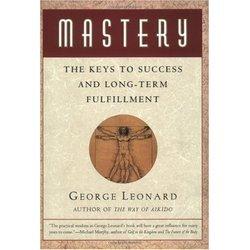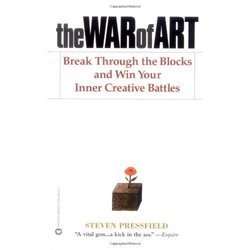A few weeks ago, we talked about How to Know When to Quit, and Seth Godin’s handy little guidebook The Dip.
There’s one more recommendation Seth makes in The Dip to help us know whether to move forward with a project, or quit and move on.
He asks, “Can you become the best?”
If you’re not planning on becoming the best at what you’re engaged in, why continue? Because the point of your entrepreneurial endeavor, Seth reasons, is to get noticed, to get remarked about, or to be purchased, read, consumed, and enjoyed.
And, in today’s fractured marketplace, the only way to achieve any of those things is to become the best in your niche.
Writes Seth:
If you’re doing your best, only your soccer coach cares. If you’re the best in the world, the market cares. The secret, if you have limited resources (don’t we all) is to make ‘world’ small enough that you can actually accomplish that.
Are You Pursuing Your Best?
If you read The Dip you may come to see as I did that this isn’t a book about quitting, or even a book about The Dip, at all. This little tome is really about working through the Dip and achieving mastery, which happens to be the title of one of my favorite books.
In George Leonard’s Mastery, he describes performance at four levels of participation: The Dabbler, The Obsessive, The Hacker, and The Master.
Here’s a quick summary of the four levels.
The Dabbler
The Dabbler’s learning curve rises very quickly, meets an obstacle and then drops to zero, since the dabbler gives up the activity and goes on to another; repeating the same learning curve over and over again.
The Obsessive
The Obsessive’s learning curve rises quickly, learns all he can about the subject at hand. Then he meets obstacles, which The Obsessive tackles by redoubling his effort, devouring even more books and tools, and then burns out when he finds that the curve is not a straight line upwards.
The Hacker
The Hacker’s learning curve rises quickly, and upon meeting an obstacle or two, plateaus out on a straight line. The Hacker doesn’t consider the need for more instruction or rising above that level. He is content with level reached and plans to stay at that level.
The Master
The Master’s learning curve rises quickly, plateaus for a while, and with consistent practice, rises again with some regression and plateaus again for a while and so on. The Master knows that Mastery is a lifetime path. The Master enjoys living on the plateau. The Master knows that while he is on the plateau, learning is happening and practice will inevitably raise him to a higher level.
I think you would enjoy reading the book to discover the finer points of each level. Mr. Leonard describes Mastery as a lifetime of dips, with most of our time spent on “the plateau.”
Learning any new skill involves relatively brief spurts of progress, each of which is followed by a slight decline to a plateau somewhat higher in most cases than that which preceded it.
Writes Mr. Leonard:
In the actual learning experience . . . the upward spurts vary; the plateaus have their own dips and rises along the way. To take the master’s journey, you have to … attain new levels of competence. You also have to be willing to spend most of your time on the plateau, to keep practicing even when you seem to be getting nowhere.
Leonard’s plateau sounds a lot like Godin’s dip.
Are You a Hobbyist or a Professional?
Like clock-work, American Idol canvassed the country this past summer, searching for their next cast of twelve superstar-hopefuls. Shows like this attract thousands of part-time singers – kids who would pursue singing as a career only if it were easy and fit in with their daily shopping schedule at the mall.
One of the reasons shows like American Idol fascinate me is because the process these kids go through is a lot like beginning any entrepreneurial venture. I like to watch the behind-the-scenes “bootcamp” weeks where the kids are put through their paces to see what they’re made of. Those kids who make it through the American Idol bootcamp are the budding professionals.
 And that leads us to another helpful way to frame our time on the plateau or in the dip while seeking mastery: the difference between hobbyists and professionals, a topic Steven Pressfield tackles expertly in his book The War of Art. Pressfield begins by defining what he calls Resistance:
And that leads us to another helpful way to frame our time on the plateau or in the dip while seeking mastery: the difference between hobbyists and professionals, a topic Steven Pressfield tackles expertly in his book The War of Art. Pressfield begins by defining what he calls Resistance:
(Resistance is) the enemy – our chattering brain, which, if we give it so much as a nanosecond, will start producing excuses, alibis, transparent self-justifications, and a million reasons why we can’t/shouldn’t/won’t do what we know we need to do.
Here’s just a snippet from Pressfield about the Professional:
Aspiring artists defeated by Resistance share one trait. They all think like amateurs. They have not yet turned pro.
The amateur plays for fun. The professional plays for keeps.
The amateur plays part-time, the professional full time.
The word amateur comes from the Latin root meaning ‘to love.’ The conventional interpretation is that the amateur pursues his calling out of love, while the pro does it for money. Not the way I see it. In my view, the amateur does not love the game enough. If he did, he would not pursue it as a sideline, distinct from his “real” vocation.
The professional loves it so much he dedicates his life to it. He commits full time.
That’s what I mean when I say turning pro.
Resistance hates it when we turn pro.
Read that whole section in The War of Art. I sometimes find myself re-reading sections from that book a few times each month, just to keep me focused.
A final reference point for all of us pursuing mastery: Steven Pressfield’s latest book, Do The Work.
In one tasty section, Steven refers to two of George Leonard’s themes, mastery and dabbling, and offers a little assessment to test how badly you want the success that will come from working through the plateau.
He calls his first test “How bad do you want it?”
‘How bad do you want it?’ is Resistance’s first question. The scale below will help you answer. Mark the selection that corresponds to how you feel about your book/movie/ballet/new business/whatever.
Dabbling • Interested • Intrigued but Uncertain • Passionate • Totally Committed
Pressfield goes on to recommend that if your response to the above question is not “Totally Committed,” then “put this book down and throw it away.”
Strong words.
What do you think?
With everything else on your plate, do you think you can succeed as an entrepreneur if you look at it as a part-time hobby?
Is Pressfield’s assessment right, or is there room for some middle ground?
While pursuing your entrepreneurial dreams, can you be part-time and still fully committed?

Hi, Keith,
Wow! Thank you for sharing another inspiring post while holding a mirror to my face. Me thinks you must have returned from some kind of ‘Tough Love’ seminar. :~)
When my head hits my pillow each night, I’ll now ask myself: ‘Have I done everything I could today, to nurture, care for and expand my blog, http://ThePowerToLive.com ?
Very dear friends turned me onto Steven Pressfield. The man is a genius!
Please allow me to share my favorite quote from Pressfield on human nature. It sits on my desk, staring back at me, in an inspiring kind of way.
‘The more important a project is to your soul’s evolution, the more you’ll resist it.’
~Steven Pressfield
Your post inspired me to take inventory of the ways I could be holding myself more accountable.
Thank you for the kick in the proverbial pants, brother!
Connie
Hi Connie,
Thanks for the great comment! And amen to that Pressfield quote – that’s the challenge, in a nutshell. That mirror was definitely held to my face, first.
Thanks for reading, Connie.
Keith
Keith,
I’m headed for the airport, so I’m gonna’ hack away at this comment and tell you: “I cave!” After much arm twisting, you sold me on Seth, and now Steven Pressfield is downloading on my kindle as I write this. Seems like ideal plane-fare.
Thanks for an inspiring post – a lot of food for thought.
Gregory
Gregory,
I don’t know how long your flight is, but there’s a very good chance you’ll be able to finish Steven Pressfield’s book before you land. Pressfield’s books are quick, short reads, ala: Seth Godin’s.
My copy of ‘The War of Art’ is filled with post-it notes marking pages. Like Keith, I find myself re-reading sections at least once a month to keep fanning the flames of inspiration.
I’d love to hear what you think of ‘The War of Art’ after you read it.
Connie
Gregory,
Safe travels – and I’m happy to hear you downloaded Pressfield! Even on that dim Kindle screen, these books are gems.
Keith
Hey Keith, this post hit on a topic I’m really interested in right now – but you just touched on it. More, please!?!
You quote Seth Godin about making your world small enough to be best in that niche. That is a very cool concept, and I’d really like to grasp that fully. Could you do a post on that?
Thanks for the book recommendations. Already got the War of Art, and that Mastery book looks great.
Hi Craig,
This is a topic we can never write too much about – the number one request we get in coaching is niching.
You got it. Look for that in the new year.
In the meantime, check out this oldie (but goodie….): http://transformnation.com/741/how-your-unique-voice-can-attract-a-crowd/
Thanks for the comment.
Keith
Keith,
I am responding to your thought-provoking questions: I built my own therapy practice and I guess you Americans would call that “Entrepreneurship?” I was attending school and working as an intern at a hospital and knew I wanted to have my own practice. Others I graduated University with who also told me they wanted their own practices still don’t have their own, and I do. The difference, I believe, is what Steven Pressfield points to, he is correct, I believe: You can not be just “dabbling” or vaguely interested in building a business, you must be 100% committed.
Even though I was working a part-time job when I established my practice, my focus on starting that practice was intensely focused 100% on making it work. And now, I am starting my internet business, and like my practice twenty years ago, I am 100% committed to making this work. Thank you for the inspiration. Happy new year!
Iala!
Hello Iala!
Nice to hear from you again, and thanks for sharing the story of building your practice.
I am certain you will bring the same level of success to your new online business that you have to your therapy practice.
Thanks for reading,
Keith